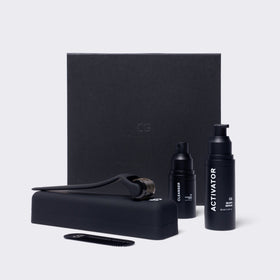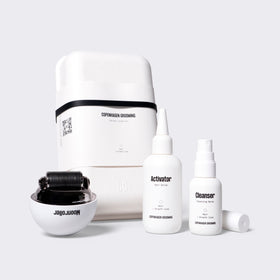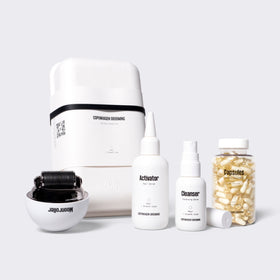Written by: Simon Bang|Time to read 5 min
Navigating Regrowth: How long does it take for hair to grow back?
Experiencing thinning hair can be a frustrating challenge, impacting both your appearance and self-esteem. Fortunately, a variety of effective products for thinning hair can help strengthen your hair and promote new growth. In this guide, we'll dive into the best products for thin hair, offering solutions to combat hair loss effectively.
Understanding Hair Growth
How does hair grow?
This question is at the heart of our journey. The hair growth cycle comprises three phases: anagen phase (growth), catagen phase (transition) , and telogen (resting phase). Influenced by genetics, health, and care practices, the cycle dictates how long it takes for hair to grow and how long it takes hair to grow back after being cut or lost due to other reasons. Generally, hair grows about half an inch per month, though this can vary widely among individuals.
The Resting Phase and Telogen Effluvium
During the telogen (resting phase), hair follicles are in a state of rest before shedding and being replaced by new growth. Understanding the resting phase is crucial, as disruptions can lead to telogen effluvium, a condition characterized by excessive hair shedding. This stage is a natural part of the hair growth cycle, but maintaining scalp health can help minimize adverse effects.
Stages of Hair Growth
The stages of hair growth - anagen, catagen , and telogen - are influenced by numerous factors. The catagen phase , a brief transitional period, precedes the resting phase. During catagen, hair follicles shrink, and growth slows down. Following this, the telogen phase allows the scalp to rest before the cycle restarts. Understanding these stages is crucial for developing effective hair care routines tailored to individual needs. This knowledge can help you combat hair thinning, promote a healthy hair and scalp environment, that stimulates hair growth.

After a haircut
When you cut your hair, you're essentially removing the length of the hair shaft above the scalp. The follicles, which are responsible for hair growth, remain unaffected. Therefore, hair regrowth after a haircut relies on the natural growth cycle of the hair follicles, which typically produce hair at about half an inch per month. This rate is determined by the anagen phase of the hair cycle, a period of active growth that can last between 2 to 6 years for scalp hair.
After Chemotherapy
Chemotherapy works by targeting rapidly dividing cells, a characteristic of cancer cells. Unfortunately, hair follicle cells also divide rapidly, making them collateral damage during treatment. Chemotherapy can push hair follicles into the telogen phase, a resting stage where hair falls out. Regrowth after chemotherapy is slower because the follicles need time to recover from the trauma of the drugs and resume the anagen phase. This process can vary greatly among individuals, depending on the specific chemotherapy drugs used and personal health factors.
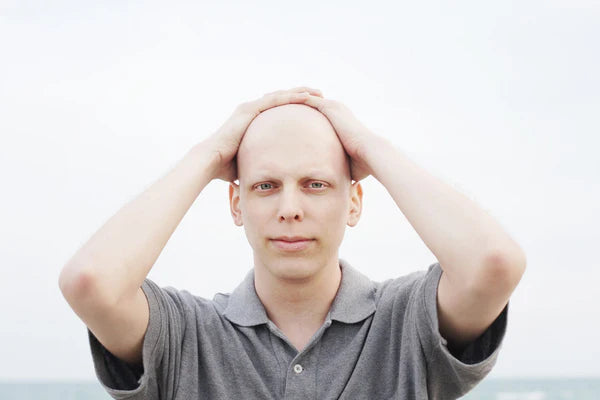
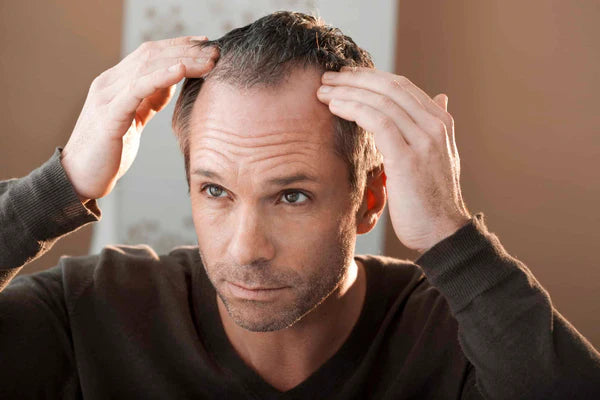
Male Pattern Baldness
Male pattern baldness (androgenetic alopecia) is caused by a combination of genetic predisposition and the presence of specific male hormones, particularly dihydrotestosterone (DHT). DHT can shrink hair follicles, shorten the anagen phase, and delay the growth of new hair. Over time, the affected follicles produce progressively thinner and shorter hair until they stop producing hair altogether. This condition involves permanent changes to the hair follicles, making natural regrowth challenging without intervention.
Hormonal Changes
How long does it take hair to grow when dealing with a hormonal imbalance? Imbalances in hormones, such as aging, male menopause - yes, it's a thing, or due to thyroid disorders, can affect the hair growth cycle. For instance, high levels of androgens can shorten the anagen phase and prolong the telogen phase, leading to increased hair shedding and slower growth. Once hormonal levels stabilize, the hair follicles can resume their normal growth cycle, allowing for hair to grow back at its usual rate.

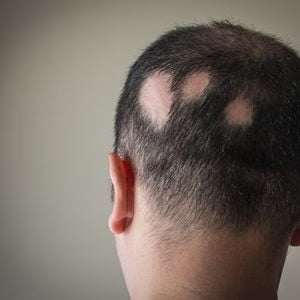
Dermatological Conditions
Conditions like alopecia areata and scalp psoriasis impact hair growth by directly affecting the health of the scalp and hair follicles. Alopecia areata is an autoimmune condition where the immune system attacks hair follicles, causing hair to fall out in patches and significantly slowing down regrowth. Scalp psoriasis can lead to a buildup of skin cells that creates a scaly, itchy rash, impairing the ability of hair follicles to produce hair normally. Treatment of these underlying conditions can alleviate symptoms and, in some cases, allow hair follicles to recover and resume producing hair.
Understanding the biological and hormonal influences on hair growth provides insight into why hair regrowth can vary so widely in these different scenarios. Each condition affects the hair follicles and growth cycle in unique ways, influencing the timeframe for hair to regrow and the effectiveness of potential treatments.
Accelerating Hair Regrowth
We present The Hair Growth Kit, an answer to the quest for effective hair regrowth solutions. Celebrated for its innovative approach, this kit combines micro-needling with our exclusive Triple Complex formula to encourage new, healthy hair growth.
The Moonroller
Utilizing a derma roller for hair before and after treatment showcases significant improvements in scalp health and hair density. This tool, designed with precision-engineered titanium needles, stimulates the scalp to enhance blood circulation and nutrient delivery, awakening dormant follicles.
The Activator with Triple Complex™
Our potent serum has shown remarkable effectiveness in clinical trials, significantly reducing hair loss and awakening thousands of new hairs. It stands as a testament to the possibility of regrowing hair without side effects.
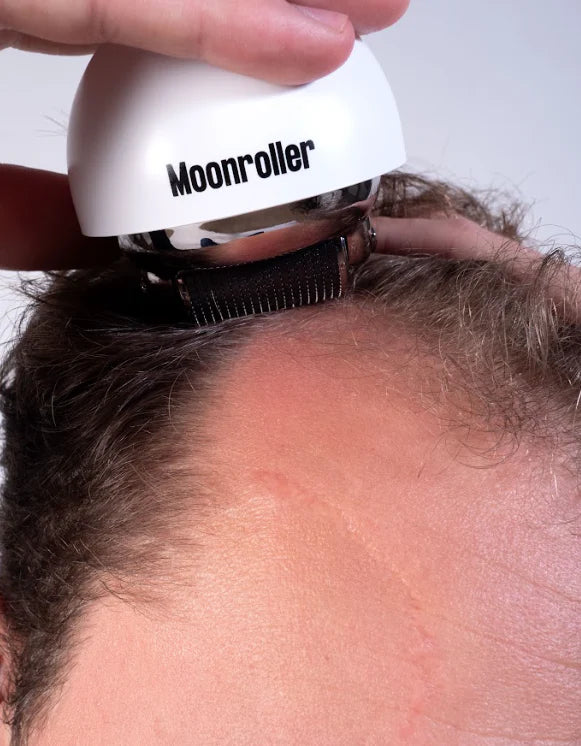
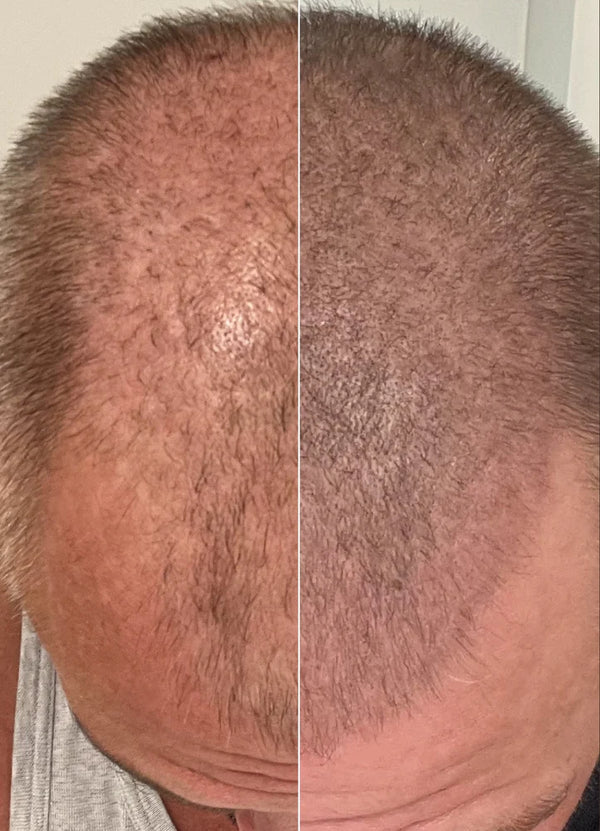
How to grow hair back faster
For those looking to expedite their hair regrowth journey, incorporating our Hair Growth Kit into your daily regimen is a game-changer. Regular use is essential for achieving noticeable results, underscoring the answer to how to grow hair back fast.
Exploring Hair Revival with the Derma Roller: A Before and After
Remarkable narratives of transformation, like Morten's shift from sparse to flourishing locks, stand as strong endorsements for the efficacy of integrating derma rolling with our Hair Activator, key components of the Hair Growth Kit. Before and after imagery showcases the dual capacity to not only reduce hair shedding but also to encourage the emergence of new, vibrant strands.
Duration of Treatment: 160 Days
Accelerate hair growth
Understanding the nuances of hair growth empowers us to navigate its challenges with confidence. Whether dealing with a recent haircut, the aftermath of chemotherapy, genetic baldness, hormonal shifts, or skin conditions, knowledge paired with the right tools, like Copenhagen Grooming's Hair Growth Kit, sets the stage for successful hair recovery. Patience, consistency, and the right care are your allies in the journey towards achieving healthier, fuller hair.
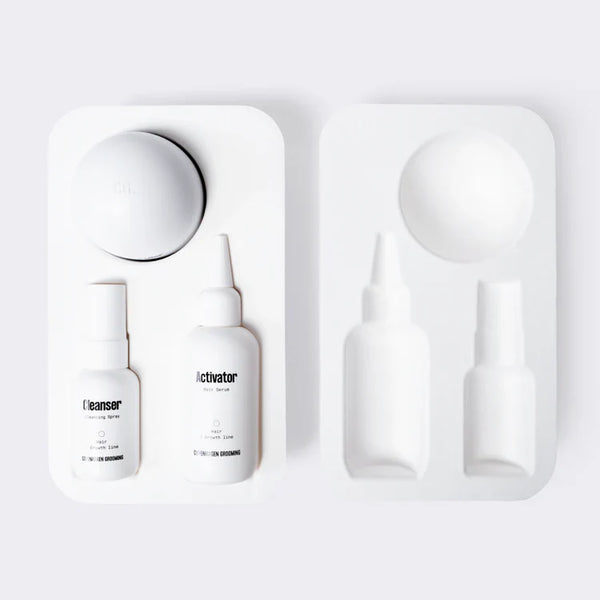
FAQ
Group

Simon Bang, Co-Founder
Meet Simon, one of the co-founders of Copenhagen Grooming. His passion for men's grooming and expertise in communication have shaped the brand's ethos. Simon curates grooming solutions, writes content, and educates about the products.
We're pretty sure you'll like these blog posts as well
Select your shipping destination
- Africa
- The Americas
- Asia
- Europe
- Middle East
- Oceania
